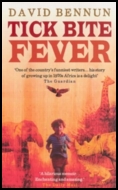| Text to separate 1 |  | Text to separate |  |
| Text to separate 1 | Tick Bite Fever | Text to separate | British As A Second Language |
|
Available now from Ebury Press:
British As A Second Language More details here Click here to buy it Also published by Ebury: Dave's highly acclaimed African memoir Tick Bite Fever |
| Aimee Mann/ Richmond Fontaine/ Teenage Fanclub/ Weezer/ Morcheeba/ Spoon [The Mail On Sunday, 2005] IT'S BEEN A good week for The Song. You'd think, what with the abundance of singer-songwriters currently flapping their soiled sheets at the public, that every week is a good week for The Song. Not so. A preoccupation with your own psychological laundry basket doesn't in itself make the contents of interest. But Aimee Mann is another bundle of smalls. Her reputation rests, very comfortably, on her contribution to the soundtrack of Paul Thomas Anderson's Magnolia, and her subsequent Lost In Space LP. There's nothing extraordinary about Mann's style: it's direct, arranged traditionally - sturdily, even - and with little ornamentation. What sets her apart is her capacity to generate a certain cool and measured melancholy. Mann brings atmosphere to a genre which often relies too heavily upon personality alone. The Forgotten Arm (V2)*** comprises a dozen characteristically heartworn numbers. Mann's skill at spinning emotional weariness into moving and at times compelling songcraft is best showcased on I Was Thinking I Could Clean Up For Christmas and That's How I Knew This Story Would Break My Heart - titles that tell a tale by themselves. You can see why she was well suited to Anderson's variation on Robert Altman's Short Cuts. Short Cuts, in turn, was based upon the short stories of Raymond Carver, whose influence also extends to Willy Vlautin, the songwriter behind Richmond Fontaine. Last year's remarkable Post To Wire was a gloomy piece of Americana, but in retrospect it acquires a certain dry cheer when set against The Fitzgerald (Decor)*** - a further collection of narratives from the American underbelly. Low-key and spare to the point of emaciation, it inevitably calls to mind Springsteen's Nebraska (minus the intermittent bluster), and stands comparison with it too. Like ELO with The Beatles, or Tom Petty with Bob Dylan, Teenage Fanclub are an act whose devotion to another has defined their career. In their case the other act is Big Star, whose ringing, harmonised tunes rightly inspire cultish zeal. Teenage Fanclub too have acquired a smallish but fervent audience. Listen to It's All In My Mind, the sublime opener on Man-Made (PeMa)***, and you may feel impelled to enroll. Even if it can't quite live up to that first, sparkling moment, Man-Made is a welcome return from one of the very few groups to approach the ideal of perfect guitar pop with as much inspiration as imitation. They're on tour this month, too. There are times when you have to acknowledge the accomplishments of a band you have no strong feelings about. The chunky nerd-rock of Weezer has earned them a following, and that following will have every reason to be delighted with Make Believe (Geffen)**. It's got the melodies, the semi-ironic but essentially sincere introspection, the affectionate references to 70s FM rock - and it does nothing for me at all. I don't dislike it. I recognise that it's a good Weezer record. And I'll not think about them again until the next one. Morcheeba, on the other hand, I do dislike. The diminishing of trip hop from haunted psychodrama to insipid lifestyle accessory was, I suppose, inevitable. But their position in the vanguard of that particular cocktail party makes them as blameworthy as anyone. Their fifth album, The Antidote (Echo)* finds them with a new singer, and its template appears to be the Propellerheads/Shirley Bassey collaboration, History Repeating. This album may sound bland and harmless, but it's assembled from the mortal remains of something thrilling and dark. Spoon might look at the triumph of Scissor Sisters and wonder if all they need is flamboyant stage suits. Maybe they could borrow some, as they do everything else. Once The Pixies were the unwitting lenders. Now, on Gimme Fiction (Matador)***, 70s British rockers including Mott The Hoople, ELO (them again) and Badfinger, alongside sundry post-punksters, provide the goods. And here, too, it's the songs that make the pastiche not just bearable but enjoyable. Several of these tracks could happily slot into the Greatest Hits of their indirect originators. All material on this site is copyrighted © to David Bennun and may not be reprinted or reused without permission. Right? Right. Back to Music Reviews
Back to Pop |
| Text to separate 1 |  | Text to separate |  |
| Text to separate 1 | Tick Bite Fever | Text to separate | British As A Second Language |